 W
WAgriprocessors was the corporate identity of a slaughterhouse and meat-packaging factory based in Postville, Iowa, best known as a facility for the glatt kosher processing of cattle, as well as chicken, turkey, duck, and lamb. Agriprocessors' meat and poultry products were marketed under the brand Iowa Best Beef. Its kosher products were marketed under various labels, including Aaron’s Best, Shor Habor, Supreme Kosher, and Rubashkins.
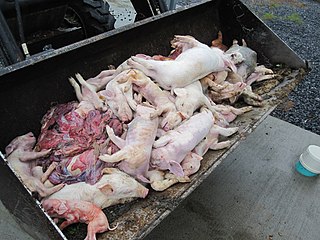 W
WSeveral writers, including Jewish Nobel Prize laureate Isaac Bashevis Singer, and animal rights groups have drawn a comparison between the treatment of animals and the Holocaust. The comparison began immediately after the end of World War II, when Jewish writers recounted the lack of resistance by European Jewish victims of the Holocaust, who were led to their death as "sheep to slaughter". The comparison is regarded as controversial, and has been criticized by organizations that campaign against antisemitism, including the Anti-Defamation League (ADL) and the United States Holocaust Memorial Museum.
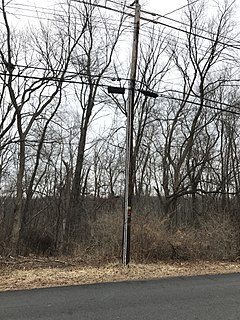 W
WIn July 2017, the municipalities of Mahwah, Upper Saddle River, and Montvale in Bergen County, New Jersey, in the United States, opposed extension of an eruv within their borders. An eruv is a land area surrounded by a boundary of religious significance, often marked by small plastic pipes attached to utility poles. The demarcation permits Orthodox Jews to push or carry objects within the eruv on the Jewish Sabbath that otherwise is considered forbidden under Orthodox Jewish law.
 W
WThere are a number of passages in the Hebrew Bible and the New Testament that have been interpreted as involving same-sex sexual acts and desires. These interpretations form the basis of Jewish and Christian attitudes towards homosexuality.
 W
WThe Council of Jamnia was a council purportedly held late in the 1st century CE to finalize the canon of the Hebrew Bible. It has also been hypothesized to be the occasion when the Jewish authorities decided to exclude believers in Jesus as the Messiah from synagogue attendance, as referenced by interpretations of John 9:22 in the New Testament. The writing of the Birkat haMinim benediction is attributed to Shmuel ha-Katan at the supposed Council of Jamnia.
 W
WThe Crusades were a series of religious wars initiated, supported, and sometimes directed by the Latin Church in the medieval period. The term refers especially to the Eastern Mediterranean campaigns in the period between 1095 and 1271 that had the objective of conquering the Holy Land from Islamic rule. The term has also been applied to other church-sanctioned campaigns fought to combat paganism and heresy, to resolve conflict among rival Roman Catholic groups, or to gain political and territorial advantage. The difference between these campaigns and other Christian religious conflicts was that they were considered a penitential exercise that brought forgiveness of sins declared by the church. Historians contest the definition of the term "crusade". Some restrict it to only armed pilgrimages to Jerusalem; others include all Catholic military campaigns with a promise of spiritual benefit; all Catholic holy wars; or those with a characteristic of religious fervour.
 W
WThe Hamburg Temple disputes were the two controversies which erupted around the Israelite Temple in Hamburg, the first permanent Reform synagogue, which elicited fierce protests from Orthodox rabbis. The events were a milestone in the coalescence of both modern perceptions of Judaism. The primary occurred between 1818 and 1821, and the latter from 1841 to 1842.
 W
WThe heresy of Peor is an event related in the Torah at Numbers 25:1–15. Later biblical references to the event occur in Numbers 25:18 and 31:16, Deuteronomy 4:3, Joshua 22:17, Hosea 9:10; Psalm 106:28. New Testament references are found in 1 Corinthians 10:8 and Revelation 2:14.
 W
WHerod I, also known as Herod the Great, was a Roman client king of Judea, referred to as the Herodian kingdom. The history of his legacy has polarized opinion, as he is known for his colossal building projects throughout Judea, including his renovation of the Second Temple in Jerusalem and the expansion of the Temple Mount towards its north, the Tomb of the Patriarchs in Hebron, the construction of the port at Caesarea Maritima, the fortress at Masada, and Herodium. Vital details of his life are recorded in the works of the 1st century CE Roman–Jewish historian Josephus. Herod also appears in the Christian Gospel of Matthew as the ruler of Judea who orders the Massacre of the Innocents at the time of the birth of Jesus, although a majority of Herod biographers do not believe this event to have occurred. Despite his successes, including singlehandedly forging a new aristocracy from practically nothing, he has still garnered criticism from various historians. His reign polarizes opinion amongst scholars and historians, some viewing his legacy as evidence of success, and some as a reminder of his tyrannical rule.
 W
WJewish identity is the objective or subjective state of perceiving oneself as a Jew and as relating to being Jewish. Under a broader definition, Jewish identity does not depend on whether a person is regarded as a Jew by others, or by an external set of religious, or legal, or sociological norms. Jewish identity does not need to imply religious orthodoxy. Accordingly, Jewish identity can be cultural in nature. Jewish identity can involve ties to the Jewish community. Orthodox Judaism bases Jewishness on matrilineal descent. According to Jewish law (halacha), all those born of a Jewish mother are considered Jewish, regardless of personal beliefs or level of observance of Jewish law.
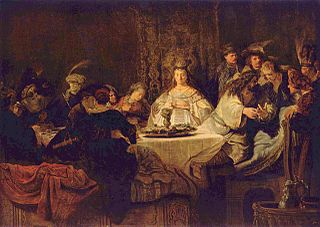 W
WInterfaith marriage in Judaism was historically looked upon with very strong disfavour by Jewish leaders, and it remains a controversial issue among them today. In the Talmud and all of resulting Jewish law until the advent of new Jewish movements following the Jewish Enlightenment, the "Haskala", marriage between a Jew and a gentile is both prohibited, and also void under Jewish law.
 W
WThe Invention of the Jewish People is a study of the historiography of the Jewish people by Shlomo Sand, Professor of History at Tel Aviv University. It has generated a heated controversy. The book was in the best-seller list in Israel for nineteen weeks.
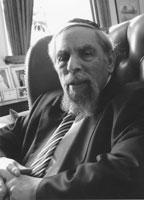 W
WRabbi Dr Louis Jacobs CBE was a leading writer and theologian. He was the rabbi of the New London Synagogue in the United Kingdom. He was also the focus in the early 1960s of what became known as "The Jacobs Affair" in the British Jewish community.
 W
WKapparot is a customary atonement ritual practiced by some Jews on the eve of Yom Kippur. This is a practice in which a chicken or money is waved over a person's head and the chicken is then slaughtered in accordance with halachic rules.
 W
WThe Kotel compromise is a compromise reached between orthodox and non-orthodox Jewish denominations, according to which the non-Orthodox "mixed" prayer area for men and women was supposed to be expanded in the southern part of the Western Wall. In contrast to the existing situation, access to this "mixed" prayer area was supposed to be from the main entrance to the Western Wall, and in addition it was supposed to be run by a council in which representatives of the non-Orthodox denominations and women of the Wall.
 W
WThe legal aspects of ritual slaughter include the regulation of slaughterhouses, butchers, and religious personnel involved with traditional shechita (Jewish) and dhabiha (Islamic). Regulations also may extend to butchery products sold in accordance with kashrut and halal religious law. Governments regulate ritual slaughter, primarily through legislation and administrative law. In addition, compliance with oversight of ritual slaughter is monitored by governmental agencies and, on occasion, contested in litigation.
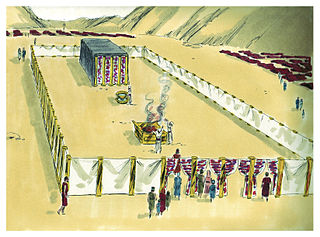 W
WLeviticus 18 deals with a number of sexual activities considered abominable, including incest, bestiality, and "lying with a man as with a woman". The chapter also condemns Moloch worship. It is part of the Holiness Code, and its sexual prohibitions are largely paralleled by Leviticus 20 - except that Ch. 20 has more emphasis on punishment.
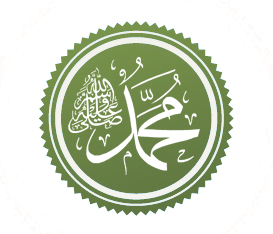 W
WVery few texts in Judaism refer to or take note of the Islamic prophet, Muhammad. Those that do generally reject Muhammad's proclamation of receiving divine revelations from God and label him instead as a false prophet.
 W
WThe Passion of the Christ is a 2004 American biblical drama film produced, co-written and directed by Mel Gibson and starring Jim Caviezel as Jesus of Nazareth, Maia Morgenstern as the Virgin Mary, and Monica Bellucci as Mary Magdalene. It depicts the Passion of Jesus largely according to the gospels of Matthew, Mark, Luke and John. It also draws on pious accounts such as the Friday of Sorrows, along with other devotional writings, such as the reputed visions attributed to Anne Catherine Emmerich.
 W
WThe Sanhedrin were assemblies of either twenty-three or seventy-one elders, who were appointed to sit as a tribunal in every city in the ancient Land of Israel.
 W
WThe Greek Old Testament, or Septuagint, is the earliest extant Koine Greek translation of books from the Hebrew Bible, various biblical apocrypha, and deuterocanonical books. The first five books of the Hebrew Bible, known as the Torah or the Pentateuch, were translated in the mid-3rd century BCE; they did not survive as original-translation texts, however, except as rare fragments. The remaining books of the Greek Old Testament are presumably translations of the 2nd century BCE.
 W
WThe Shabbos App is a proposed Android app that is claimed to enable Orthodox Jews, and Jewish Sabbath-observers, to use a smartphone on the Sabbath. The App was supposed to appear in late 2014. Some argued from the outset that this project was nothing more than an elaborate hoax, or prank, of some kind.
 W
WShammai was a Jewish scholar of the 1st century, and an important figure in Judaism's core work of rabbinic literature, the Mishnah.
 W
WJewish views on slavery are varied both religiously and historically. Judaism's ancient and medieval religious texts contain numerous laws governing the ownership and treatment of slaves. Texts that contain such regulations include the Hebrew Bible, the Talmud, the 12th-century Mishneh Torah by rabbi Maimonides, and the 16th-century Shulchan Aruch by rabbi Yosef Karo. The original Israelite slavery laws found in the Hebrew Bible bear some resemblance to the 18th-century BCE slavery laws of Hammurabi. The regulations changed over time. The Hebrew Bible contained two sets of laws, one for Canaanite slaves, and a more lenient set of laws for Hebrew slaves. From the time of the Pentateuch, the laws designated for Canaanites were applied to all non-Hebrew slaves. The Talmud's slavery laws, which were established in the second through the fifth centuries CE, contain a single set of rules for all slaves, although there are a few exceptions where Hebrew slaves are treated differently from non-Hebrew slaves. The laws include punishment for slave owners that mistreat their slaves. In the modern era, when the abolitionist movement sought to outlaw slavery, supporters of slavery used the laws to provide religious justification for the practice of slavery.
 W
WThe Tribunal of the Holy Office of the Inquisition, commonly known as the Spanish Inquisition, was established in 1478 by Catholic Monarchs, King Ferdinand II of Aragon and Queen Isabella I of Castile. It was intended to maintain Catholic orthodoxy in their kingdoms and to replace the Medieval Inquisition, which was under Papal control. It became the most substantive of the three different manifestations of the wider Catholic Inquisition along with the Roman Inquisition and Portuguese Inquisition. The "Spanish Inquisition" may be defined broadly, operating in Spain and in all Spanish colonies and territories, which included the Canary Islands, the Kingdom of Naples, and all Spanish possessions in North, Central, and South America. According to modern estimates, around 150,000 were prosecuted for various offenses during the three-century duration of the Spanish Inquisition, out of which between 3,000 and 5,000 were executed.
 W
WThe Thirteenth Tribe is a 1976 book by Arthur Koestler, in which the author advances the thesis that Ashkenazi Jews are not descended from the historical Israelites of antiquity, but from Khazars, a Turkic people. Koestler hypothesized that the Khazars migrated westwards into Eastern Europe in the 12th and 13th centuries when the Khazar Empire was collapsing.
 W
WAnti-Jewish laws were enacted by the Vichy France government in 1940 and 1941 affecting metropolitan France and its overseas territories during World War II. These laws were, in fact, decrees of head of state Marshal Philippe Pétain, since Parliament was no longer in office as of 11 July 1940. The motivation for the legislation was spontaneous and was not mandated by Germany. These laws were declared null and void on 9 August 1944 after liberation and on the restoration of republican legality.
 W
WWatto is a fictional character in the Star Wars franchise, featured in the films The Phantom Menace and Attack of the Clones. He is computer-generated and is voiced by voice actor Andy Secombe. He is a mean-tempered, greedy Toydarian, and owner of a second-hand goods store in Mos Espa on the planet Tatooine. Among Watto's belongings are the slaves Shmi Skywalker and her son, Anakin. He acquires them after winning a podracing bet with Gardulla the Hutt, and he puts them both to work in his store. Anakin demonstrates an incredible aptitude for equipment repair, and Watto decides to profit from it by having the boy fix various broken equipment in the store. He eventually loses Anakin in a podracing bet with Qui-Gon Jinn when he bets on a competitor, Sebulba, who is defeated by Anakin.
 W
WWomen of the Wall is a multi-denominational Jewish feminist organization based in Israel whose goal is to secure the rights of women to pray at the Western Wall, also called the Kotel, in a fashion that includes singing, reading aloud from the Torah and wearing religious garments. Pew Research Center has identified Israel as one of the countries that place "high" restrictions on religion, and there have been limits placed on non-Orthodox streams of Judaism. One of those restrictions is that the Rabbi of the Western Wall has enforced gender segregation and limitations on religious garb worn by women. When the "Women of the Wall" hold monthly prayer services for women on Rosh Hodesh, they observe gender segregation so that Orthodox members may fully participate. But their use of religious garb, singing and reading from a Torah have upset many members of the Orthodox Jewish community, sparking protests and arrests. In May 2013 a judge ruled that a 2003 Israeli Supreme Court ruling prohibiting women from carrying a Torah or wearing prayer shawls had been misinterpreted and that Women of the Wall prayer gatherings at the wall should not be deemed illegal.